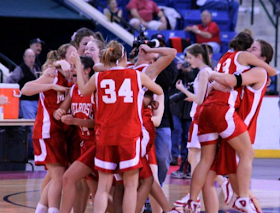Coaching is connecting. But connection doesn't mean unchecked freedom. Our profession demands HAIR - honesty, authenticity, integrity, and respect - all of which require mutual participation. Promising a role insincerely might catch a fish today while destroying two reputations tomorrow. We cannot earn respect without showing it.
Coaches set limits. Players can discuss improving skills and increasing their roles. Coaches don't assign minutes by appointment; players earn roles and playing time. You cannot negotiate more time on the floor.
How do you Increase your role? Just as implementation beats innovation, effort, good decisions, and execution are central. A consistent defender who values the ball and makes players around her better can earn major minutes without scoring much. An above average scorer who does little else might be a negative overall.
Coaches must encourage great habits beginning with practice and set the performance bar high. Coachable team leaders who profit from criticism add immeasurably. The maxim that "it takes a village to raise a child" is completed by "but one child can destroy a village." Developing new leadership is vital to excellence.
Academic progress is a mandate not an option. Brad Stevens remarked that he had never seen a great defender who wasn't an excellent student. Your commitment on the floor extends to your academic achievement.
Social media deserves attention. I have an entire chapter devoted to basketball and social media in my e-book The Simple Guide to Girls' Basketball. Don't allow 140 characters to compromise a 140,000 dollar scholarship. Set expectations and rules for social media. Never permit public criticism of teammates, opponents, or programs.
Bullying is grounds for dismissal. Players should learn inclusion early and often. Maya Angelou's quote above belongs in their toolkit.
Substance use including alcohol and tobacco have no place for the developing athlete. The health detriment of tobacco is well known and aside from unlawfulness even low doses of alcohol can impair the intermediate-term (3-5 days) memory of adolescents. No means no.
We can expose young players to using media wisely. Deflecting credit to the team and teammates shows maturity and gets respect from teammates. Coaches shouldn't expect young players to be publicly accountable and need to buffer any questions inappropriate for age.
Academic progress is a mandate not an option. Brad Stevens remarked that he had never seen a great defender who wasn't an excellent student. Your commitment on the floor extends to your academic achievement.
Social media deserves attention. I have an entire chapter devoted to basketball and social media in my e-book The Simple Guide to Girls' Basketball. Don't allow 140 characters to compromise a 140,000 dollar scholarship. Set expectations and rules for social media. Never permit public criticism of teammates, opponents, or programs.
Bullying is grounds for dismissal. Players should learn inclusion early and often. Maya Angelou's quote above belongs in their toolkit.
Substance use including alcohol and tobacco have no place for the developing athlete. The health detriment of tobacco is well known and aside from unlawfulness even low doses of alcohol can impair the intermediate-term (3-5 days) memory of adolescents. No means no.
We can expose young players to using media wisely. Deflecting credit to the team and teammates shows maturity and gets respect from teammates. Coaches shouldn't expect young players to be publicly accountable and need to buffer any questions inappropriate for age.
Coaches have a great opportunity to help young people grow, but setting limits expertly helps our players navigate potential mine fields. When it goes well, it's a beautiful experience.

